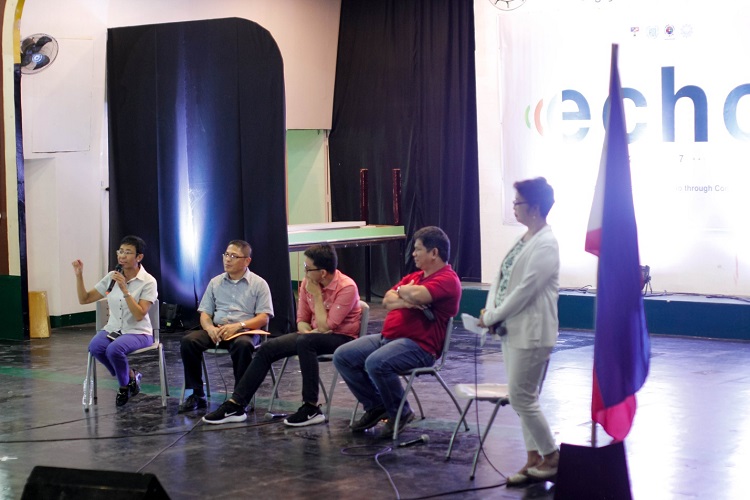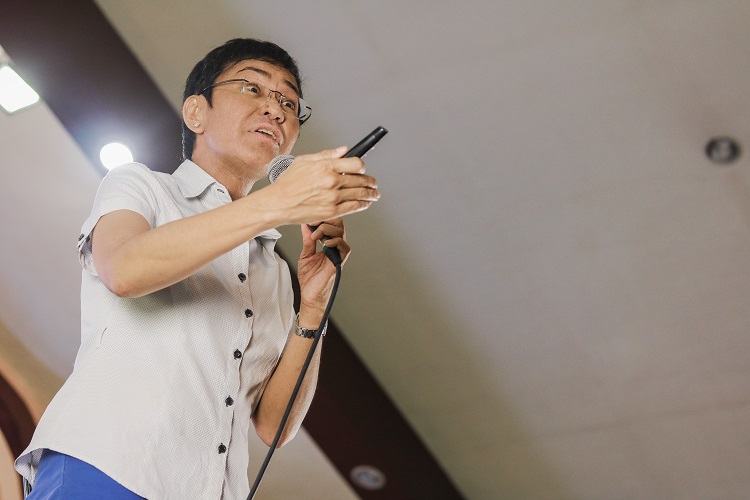
‘GO BUILD THE FUTURE!’ Maria Ressa shares an inspiring talk on information and journalism, both of which contribute to ECHO 2017’s theme on building sustainable cities. Photo by Nikkei Que.
By Alyssa Viado
After a two-year hiatus, ECHO: Mindanao Young Communicators’ Congress returned bigger and brighter than before. Bearing the theme, “Creating Sustainable Cities in Mindanao through Communication,” the event aimed to deepen the knowledge of student communicators on the United Nations’ Sustainable Development Goal No 11, to make cities inclusive, safe, resilient, and sustainable.
More than 250 participants from different colleges and universities across Mindanao packed the Pilgrim Christian College Auditorium full during the second installment of the student-led congress, with the goal of strengthening the role of communication in achieving sustainable cities – from simplifying government policies for public consumption, lifting citizen problems at the grassroots level up to the government, and bringing together the projects and facilities of public and private organizations to solve a problem.
Veteran journalist and Rappler CEO Maria Ressa served as the keynote speaker at the congress, inspiring the young communicators with powerful words and wisdom from her experiences as a journalist in Asia for more than 30 years, most of them as CNN’s bureau chief in Manila then Jakarta. She told the crowd to continue to believe in the transformative powers of media and technology.
While on our way to the airport after the congress, Ressa, the executive editor of one of the country’s leading multimedia news networks, kindly granted me a roadtrip interview on how relevant the SDGs are to building a sustainable City of Golden Friendship.
Alyssa (A): Thank you so much, Ma’am Maria for allowing me to interview you here. Relating to the ECHO congress, my first question is: How can we create sustainable cities?
Maria Ressa (MR): Education, awareness, and if it’s building communities where the problems are, then coming together to find solutions for those problems. So in CDO for example, you know that Sendong was that shockwave that went through. Had those problems been solved, the flooding that happened a month ago tells us there are other issues, other communities are vulnerable, too. It’s about trying to make sure that the information gets in the hands of the people who can do something about it.
A: How can young communicators help make an impact, especially in creating sustainable cities?
MR: Your age group has the most time to learn, study, to connect. If you choose, for example, to educate yourself more on environment, then you will see it in a completely different light, and then you’d have the energy to go and do something about it and social media makes it much easier to do today.

COLLABORATIVE WORK. Panelists and keynote speaker answer questions from the students regarding crucial matters on building sustainable cities and responsible media. Photo by Nikkei Que.
A: How relevant are the 17 United Nations Sustainable Development Goals in this time and age?
MR: I think they are perfect for governance. For Rappler, if you look at our coverage, we look through the lenses of the SDGs. We are a partner of the UNDP (United Nations Development Programme), plus Social Good – there are five of us who organize it. But why do we believe? Most people, when they’re in governance – particularly when they’re elected in democracies – they don’t have a long-term view. They look at it in terms of election cycles. So when you’re the president of the Philippines, you have a 6-year cycle. If you’re president of the United States, you have a 4-year cycle. But in the end, the world’s problems require sustained effort. One of the countries that get it right is Singapore, where they have a ten-year development plan and they stick to it regardless of who wins the elections. If our institutions were stronger, we’d be able to do this. SDGs, as some of best minds around the world, are saying: “What does this earth look like? What could be the drivers of governance that would be important for any country around the world? How can we work together, collaboratively so that it happens?” For Rappler, our lenses on government actually look through the lenses of the SDGs.
A: With the congress you just attended, how do you relate the theme, “Creating Sustainable Cities through Communication”?
MR: I think that right now, the challenge for the UN and for us is to make this personal – make it real for the people. Each one of these [SDGs] is an idea, but ideas that aren’t personal, never get acted on. So the challenge to communicators is to actually make it real for everyone. CDO is a little bit easier – climate change is part of people’s lives here. Sendong is a memory that’s still alive because it could happen again. And are we prepared today than we were before? Politics will follow if we look through these lenses and make them real for people, and then you have a checklist for the people you elect for office.
A: How was your experience in this year’s ECHO 2017?
MR: My bias is in information and journalism, and I loved being there because I could see, when I was talking, people were listening in a thoughtful manner and the questions showed me that they're grappling with the same issues. While they’re young, they’re actually the ones who are going to find new ways of solving an old problem. So I come out of it happy. Like, “Okay! This is okay!” I’m full of energy because the next hurdle is coming up. That’s why we do what we do.
* * *
SEASONED JOURNALIST. Maria Ressa photographed by Rey Anthony Anacleto during the ECHO: Mindanao Young Communicators’ Congress.
Joining Maria Ressa in an open forum were guest panelists – Philippines Information Agency information officer Franklin Gumapon, Sun*Star Cagayan de Oro editor in chief JB Deveza, and CDO School Board youth representative Ernesto Neri. Each panelist shared how information is crucial to their respective organizations – Gumapon tackled proper dissemination of info to the people in a top-down process; Deveza related his challenges and lessons as a regional journalist; and Neri shared on how simple acts can help make our cities more resilient, sustainable, and in turn, make the youth responsible citizens. Joining the panel discussion as the moderator was DevCom professor Dr Ma Theresa Rivera. As Maria was set for Manila, she left with a smile, overwhelmed by the enthusiastic and empowered young communicators, knowing that they are the future of the country and that the future is theirs for the taking.∎
